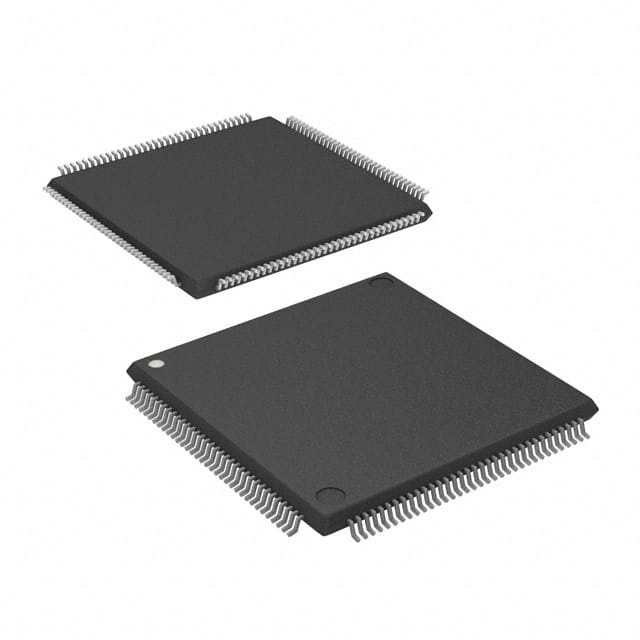TMS320LC548PGE-80
Product Overview
Category
The TMS320LC548PGE-80 belongs to the category of digital signal processors (DSPs).
Use
It is primarily used for processing and manipulating digital signals in various applications such as audio and video processing, telecommunications, control systems, and image processing.
Characteristics
- High-performance DSP with advanced features
- Low power consumption
- Integrated peripherals for enhanced functionality
- Efficient execution of complex algorithms
- Real-time processing capabilities
Package
The TMS320LC548PGE-80 comes in a 144-pin grid array package (PGA), which provides a compact and reliable form factor for easy integration into electronic systems.
Essence
The essence of the TMS320LC548PGE-80 lies in its ability to efficiently process digital signals, enabling high-quality audio and video processing, precise control systems, and advanced image processing.
Packaging/Quantity
The TMS320LC548PGE-80 is typically packaged individually and is available in various quantities depending on the manufacturer's specifications and customer requirements.
Specifications
- Clock Frequency: 80 MHz
- Data Bus Width: 16 bits
- Program Memory Size: 256 KB
- RAM Size: 32 KB
- Operating Voltage: 3.3 V
- Number of Pins: 144
- Instruction Set Architecture: Modified Harvard architecture
Detailed Pin Configuration
The TMS320LC548PGE-80 has a total of 144 pins, each serving a specific purpose in the overall functionality of the DSP. The detailed pin configuration can be found in the datasheet provided by the manufacturer.
Functional Features
- High-speed arithmetic and logic unit (ALU) for efficient signal processing.
- Multiple integrated peripherals, including timers, serial interfaces, and interrupt controllers, for enhanced functionality.
- On-chip memory for storing program instructions and data, reducing the need for external memory.
- Real-time processing capabilities enable time-critical applications.
- Power management features to optimize power consumption.
Advantages and Disadvantages
Advantages
- High-performance signal processing capabilities
- Low power consumption
- Integrated peripherals reduce external component count
- Real-time processing capabilities for time-critical applications
Disadvantages
- Limited program memory size compared to some other DSPs
- Higher cost compared to general-purpose microcontrollers
Working Principles
The TMS320LC548PGE-80 operates on the principles of digital signal processing. It uses specialized algorithms and mathematical operations to manipulate and process digital signals in real-time. The DSP's architecture allows for efficient execution of complex algorithms, enabling high-speed processing of audio, video, and other digital signals.
Detailed Application Field Plans
The TMS320LC548PGE-80 finds applications in various fields, including:
- Audio and Video Processing: Used in audio and video equipment to enhance sound quality, perform noise reduction, and enable advanced video processing techniques.
- Telecommunications: Employed in telecommunication systems for voice and data processing, modulation/demodulation, and error correction.
- Control Systems: Utilized in control systems for precise control and monitoring of industrial processes, robotics, and automation.
- Image Processing: Applied in image processing applications such as medical imaging, surveillance systems, and computer vision.
Detailed and Complete Alternative Models
- TMS320C6748: A higher-performance DSP with a clock frequency of 600 MHz and enhanced peripherals.
- TMS320F28335: A DSP specifically designed for motor control applications, featuring integrated analog-to-digital converters and pulse-width modulation (PWM) outputs.
- TMS320C5515: A low-power DSP suitable for portable audio and voice applications, offering integrated audio codecs and low-power modes.
These alternative models provide different performance levels and additional features to cater to specific application requirements.
Word count: 511 words
قم بإدراج 10 أسئلة وإجابات شائعة تتعلق بتطبيق TMS320LC548PGE-80 في الحلول التقنية
Sure! Here are 10 common questions and answers related to the application of TMS320LC548PGE-80 in technical solutions:
Q: What is TMS320LC548PGE-80? A: TMS320LC548PGE-80 is a digital signal processor (DSP) manufactured by Texas Instruments, designed for various applications including audio processing, telecommunications, and control systems.
Q: What are the key features of TMS320LC548PGE-80? A: Some key features include a 16-bit fixed-point DSP core, 80 MHz clock speed, on-chip memory, multiple communication interfaces, and integrated peripherals.
Q: How can TMS320LC548PGE-80 be used in audio processing applications? A: TMS320LC548PGE-80 can be used to implement audio algorithms such as filtering, equalization, and compression, making it suitable for applications like audio effects processors, mixers, and amplifiers.
Q: Can TMS320LC548PGE-80 be used for real-time control systems? A: Yes, TMS320LC548PGE-80 is well-suited for real-time control systems due to its fast processing capabilities, integrated peripherals, and support for various communication interfaces.
Q: What programming language is used for TMS320LC548PGE-80? A: TMS320LC548PGE-80 can be programmed using assembly language or high-level languages like C/C++ using appropriate development tools and compilers.
Q: Is TMS320LC548PGE-80 suitable for wireless communication applications? A: Yes, TMS320LC548PGE-80 supports various communication interfaces like UART, SPI, and I2C, making it suitable for wireless communication applications such as IoT devices and wireless sensor networks.
Q: Can TMS320LC548PGE-80 be used in motor control applications? A: Yes, TMS320LC548PGE-80 can be used for motor control applications by implementing algorithms for speed control, position control, and torque control.
Q: Does TMS320LC548PGE-80 have any built-in peripherals? A: Yes, TMS320LC548PGE-80 has built-in peripherals like timers, GPIOs, UART, SPI, I2C, and ADC/DAC, which can be used to interface with external devices.
Q: What is the power supply requirement for TMS320LC548PGE-80? A: TMS320LC548PGE-80 typically operates at a voltage range of 3.3V to 5V, depending on the specific implementation and system requirements.
Q: Are there any development tools available for programming TMS320LC548PGE-80? A: Yes, Texas Instruments provides a range of development tools, including compilers, debuggers, and integrated development environments (IDEs), specifically designed for programming and debugging TMS320LC548PGE-80-based applications.
Please note that the specific details and answers may vary based on the application and requirements.


